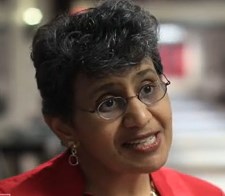User login
MIAMI – The number of women with ipsilateral breast cancer seeking a contralateral mastectomy to reduce their future risk and, essentially, for peace of mind, is increasing. Dr. Anees Chagpar director of the Breast Center, Smilow Cancer Hospital at Yale-New Haven (Conn.), suggests what doctors can include in discussions with these patients.
Presenting patients with a complete picture of risks and benefits promotes shared decision-making. Consider the absolute risk reduction provided by this type of surgery, particularly in older patients who are not BRCA 1 or 2 carriers, Dr. Chagpar said at the annual Miami Breast Cancer Conference, held by Physicians’ Education Resource.
Differences between unilateral and bilateral surgery go beyond operative time, duration of hospital stay, and risk of complications, Dr. Chagpar said, and should include a discussion about patient values and what is driving their consideration of this surgery.
Dr. Chagpar had no relevant financial disclosures.
The video associated with this article is no longer available on this site. Please view all of our videos on the MDedge YouTube channel
MIAMI – The number of women with ipsilateral breast cancer seeking a contralateral mastectomy to reduce their future risk and, essentially, for peace of mind, is increasing. Dr. Anees Chagpar director of the Breast Center, Smilow Cancer Hospital at Yale-New Haven (Conn.), suggests what doctors can include in discussions with these patients.
Presenting patients with a complete picture of risks and benefits promotes shared decision-making. Consider the absolute risk reduction provided by this type of surgery, particularly in older patients who are not BRCA 1 or 2 carriers, Dr. Chagpar said at the annual Miami Breast Cancer Conference, held by Physicians’ Education Resource.
Differences between unilateral and bilateral surgery go beyond operative time, duration of hospital stay, and risk of complications, Dr. Chagpar said, and should include a discussion about patient values and what is driving their consideration of this surgery.
Dr. Chagpar had no relevant financial disclosures.
The video associated with this article is no longer available on this site. Please view all of our videos on the MDedge YouTube channel
MIAMI – The number of women with ipsilateral breast cancer seeking a contralateral mastectomy to reduce their future risk and, essentially, for peace of mind, is increasing. Dr. Anees Chagpar director of the Breast Center, Smilow Cancer Hospital at Yale-New Haven (Conn.), suggests what doctors can include in discussions with these patients.
Presenting patients with a complete picture of risks and benefits promotes shared decision-making. Consider the absolute risk reduction provided by this type of surgery, particularly in older patients who are not BRCA 1 or 2 carriers, Dr. Chagpar said at the annual Miami Breast Cancer Conference, held by Physicians’ Education Resource.
Differences between unilateral and bilateral surgery go beyond operative time, duration of hospital stay, and risk of complications, Dr. Chagpar said, and should include a discussion about patient values and what is driving their consideration of this surgery.
Dr. Chagpar had no relevant financial disclosures.
The video associated with this article is no longer available on this site. Please view all of our videos on the MDedge YouTube channel
EXPERT ANALYSIS FROM MBCC
